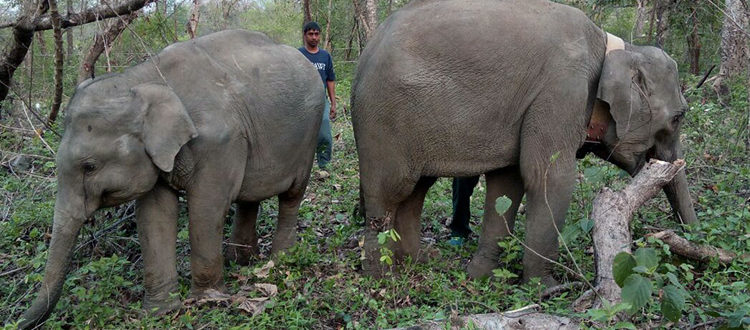Six Orphaned Asian Elephant Calves, Hand-raised at CWRC, Moved to Manas National Park for Rehabilitation
[acx_slideshow name=”CWRC Elephant Translocation 21032018″]
Manas National Park, Assam, March 21, 2018: Six orphaned female elephant calves that had been hand-raised at the Centre for Wildlife Rehabilitation and Conservation – CWRC; the wildlife rescue, treatment and rehabilitation facility jointly run by Wildlife Trust of India (WTI), the International Fund for Animal Welfare (IFAW) and the Assam Forest Department near Kaziranga National Park – have been translocated to Manas National Park, where they will be acclimatised and eventually rehabilitated back to the wild.
The calves are between four and five-and-a-half years old and were rescued from various districts of Assam by the forest department and CWRC’s Mobile Veterinary Service (MVS) units between 2013 and 2014. Orphaned calves admitted to CWRC typically undergo a period of stabilisation and treatment for specific injuries and/or ailments. They are bottle-fed with a specially developed milk formula and provided foster care by the animal keepers. After stabilisation they are gradually introduced to the other elephants being hand-raised at the centre. They begin to learn survival skills bit by bit, as the animal keepers take them on daily walks into the adjoining Panbari Reserve Forest.
For ‘Ultapani’, the youngest calf, this translocation is something of a homecoming — she was discovered by a forest patrol near her mother’s carcass in Manas National Park three years ago.
Of course, they all have their individual stories and characteristics. For instance, ‘Ghajini’, one of the older calves, was brought to CWRC when she was just three months old, with a deep, human-inflicted forehead injury that required surgical treatment. She made a swift recovery and eventually became one of the leaders of the faux herd at CWRC. ‘Dhemaji’ was brought to CWRC when she was about six months old, having been rescued while being swept away in a river in spate. She recovered from two severe bouts of diarrhoea and became one of the most social calves at the centre. ‘Usha’ was just about a year old and highly stressed when she was rescued from an island in the Brahmaputra River during the annual monsoon floods. Unlike other calves she never took to bottle feeding, preferring to graze or browse instead. Another leader of the CWRC herd, she would guide the younger calves as the elephants were taken for their daily walk. For ‘Ultapani’, the youngest calf, this translocation is something of a homecoming — she was discovered by a forest patrol near her mother’s carcass in Manas National Park three years ago.
Yesterday, the six calves received their final health checks from IFAW-WTI veterinarians. “They are all in good health”, said CWRC veterinarian Dr Panjit Basumatary, who has overseen their care at the centre. “We have conducted the clinical examinations required in the protocols of rehabilitation for hand-raised elephants, and have deemed them fit to embark upon the next stage of their journey back to the wild.”
At 2 p.m., in the presence of WTI Executive Director & CEO Vivek Menon, and IFAW Senior Program Advisor AJ Cady, a convoy of three transportation vehicles, accompanied by MVS and forest department personnel, began the 370-kilometre road journey from CWRC to Manas National Park. The convoy reached Manas at 5.10 this morning.
“The translocation has been successful”, said Dr Bhaskar Choudhury, WTI’s Head Veterinarian (North East) and Head of the IFAW-WTI Greater Manas Conservation Project. “Three calves have been radio-collared and all six will be carefully monitored for a period. Eventually, once we are certain they are properly acclimatised, they will be released into the wild, where we will continue to monitor their behaviour, survival and range utilisation post-release.”
IFAW and WTI have been working in concert with the Bodoland Territorial Council (BTC) and the Assam Forest Department since 2003 to ‘Bring Back Manas’, a UNESCO World Heritage Site whose flora and fauna were ravaged by militancy through the late 1980s and 1990s. The introduction and rehabilitation of such rescued elephants into the national park is one part of this long-term project, and eighteen calves hand-raised at CWRC have previously been released into Manas. The rehabilitation into the wild of these six calves will be another significant milestone in ongoing efforts to restore the national park to its former glory.









